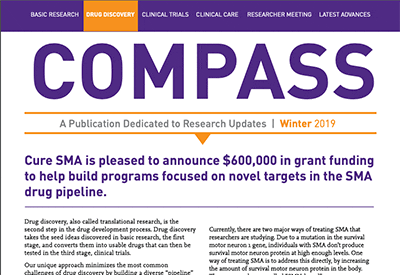
Dear Members of the SMA Community,
In light of the COVID-19 pandemic and the burden it has placed on our healthcare system, Biogen is working with health systems, institutions, physicians, patients and their families to navigate potential SPINRAZA® (nusinersen) dosing delays related to COVID-19. The health and safety of patients is our primary concern, and we are sharing data from our clinical program with health care providers that can help inform choices about patient care during these challenging times. Please see our statement here and know that Biogen will continue to work with the healthcare community to ensure people living with SMA have the care and support they need.
In addition, we are pleased to share updates about SPINRAZA, which more than three years ago became the first FDA-approved treatment option for infants, children and adults with SMA.
Major research milestones for SPINRAZA include:
- Building upon the growing body of evidence for SPINRAZA, an independent real-world study with the largest group of adults with SMA treated with SPINRAZA to date was published in The Lancet Neurology.
- The first patient has been enrolled in DEVOTE, a new global clinical study designed to evaluate the safety and potential to offer additional efficacy of SPINRAZA when administered at a higher dose than currently approved for the treatment of SMA.
- NURTURE, the first clinical study of SMA treatment in pre-symptomatic infants, has been extended by three years to a total of eight.
Additional details on these studies can be found below.
Biogen continues to invest in development of a broader data set for SPINRAZA and we are committed to ongoing research in areas of unmet medical need that may help to improve the lives of those with SMA, their caregivers and families.
We are humbled by the privilege of partnering with the SMA community and grateful for everything we have achieved in working together.
Best regards,
The Biogen SMA Team
+++
First Patient Enrolled in DEVOTE
The DEVOTE clinical trial recently enrolled its first patient. The Phase 2/3 randomized, controlled, dose-escalating study will be conducted at approximately 50 sites around the world and aims to enroll individuals of all ages with SMA. Ongoing research is instrumental to help deepen our understanding of the disease and what it means to live with SMA.
More information on the DEVOTE study (NCT04089566) is available at clinicaltrials.gov.
NURTURE Study Extension
SPINRAZA was evaluated in two Phase 3 randomized, double-blind, sham-controlled studies in infantile (ENDEAR) and later-onset (CHERISH) SMA patients. These studies were supported by open-label studies in pre-symptomatic infants (NURTURE) and in individuals with later-onset SMA (SHINE, CS2/CS12).
NURTURE, which demonstrated the critical importance of newborn screening and early treatment and redefined our expectations of how early treatment helps individuals with SMA achieve age-related milestones, has been extended by an additional three years, with follow-up of up to eight years.
NURTURE is an ongoing, Phase 2, open-label study of 25 infants with the genetic diagnosis of SMA (most likely to develop SMA Type 1 or 2) who received their first dose of SPINRAZA in the pre-symptomatic stage and before six weeks old. In this study, published in Neuromuscular Disorders, SPINRAZA provided significant results in infants treated pre-symptomatically compared to the natural history of the disease.i As of March 2019, 100% of infants treated with SPINRAZA survived, with none requiring permanent ventilation. In comparison to the natural history of SMA, many of these infants would likely have passed away or required permanent ventilation by 13.5 months on average.
Interim results to date have demonstrated longer-term efficacy up to nearly four years, with children making progress in motor milestone achievement throughout the study, a secondary endpoint. The extension of this study will enable Biogen to evaluate the efficacy and safety of SPINRAZA through to 8 years of age and further our understanding of the impact of early treatment. More information on the NURTURE study (NCT02386553) is available on clinicaltrials.gov.
Building on Later-Onset Data in Children and Adults with SMA
A pivotal study of SPINRAZA in children with later-onset SMA was published in the New England Journal of Medicine in 2018, and more recently a real world cohort of adult patients was published in Lancet Neurology.
CHERISH Study – A Pivotal Study in Children with Later-Onset SMA
CHERISH was a 15-month randomized, sham-controlled study (meaning participants were randomly placed into a treated or untreated group) in 126 individuals living with Types 2 and 3 SMA, ages 2 to 9 years old. The study evaluated the effect of SPINRAZA on motor function, including upper limb function. The dosing schedule in the study was different than the approved SPINRAZA schedule.ii
CHERISH met its primary endpoint, demonstrating a statistically significant improvement in motor function in SPINRAZA-treated patients compared to those who did not receive treatment.ii
The primary endpoint of CHERISH was change from baseline in the total Hammersmith Functional Motor Scale Expanded (HFMSE) score at month 15. The trial had six secondary endpoints, including the percentage of children who had an increase from baseline to month 15 in the HFMSE score of at least 3 points, the percentage of children who achieved at least one of six new World Health Organization (WHO) motor milestones, and the change from baseline in the Revised Upper Limb Module (RULM) score.
Lancet Neurology – An Independent Study in Adults with Later-Onset SMA
On April 1, 2020, the largest supportive study to date, focusing on adults with SMA, was published in The Lancet Neurology. This independent open-label study from 10 neuromuscular treatment centers in Germany that included 139 adults with later-onset SMA (types 2 and 3).
In this study, the authors concluded that there was a statistically significant improvement in mean HFMSE scores from baseline of 1.73 points at 6 months (n=124), 2.58 at 10 months (n=92), and 3.12 (n=57). Additionally, percent of patients with a clinically meaningful change from baseline (as defined by ≥3 point improvement) were 28%, 35%, and 40% at months 6, 10, and 14 respectively. Additional results of key secondary endpoints, upper limb function as measured by RULM (Revised Upper Limb Module) and mean walking distance as measured by 6MWT (6-Minute Walk Test), can be found in the publication.
The main limitation of the study was the absence of a control group and the observational design, two factors which can limit the extent to which study outcomes can be attributed to treatment rather than other factors. Because SPINRAZA was approved for the treatment of a severe chronic progressive disease without limitations* related to age or disease classification, the study authors state that these controls were not warranted.
*Additional limitations of The Lancet Neurology study
- Randomized controlled clinical trials are considered the gold standard of clinical research to assess the relationship between a treatment and an outcome. Observational studies are not randomized and there can be other factors that may introduce bias and affect the outcomes.
- Inter-rater variability in the evaluation of motor function, which may impact how study outcomes are interpreted, was another potential limitation in this study. To minimize this variability, all evaluators were trained and rating was done in accordance with standardized manuals.
- Furthermore, the natural disease course of SMA might be influenced by the type and level of supportive care provided to the patient. In this study, all patients had access to longstanding standard supportive care before and during nusinersen treatment. Nonetheless, this study cohort represents a multicentric real-world population of adult patients with SMA.
INDICATION
SPINRAZA® (nusinersen) is a prescription medicine used to treat spinal muscular atrophy (SMA) in pediatric and adult patients.
IMPORTANT SAFETY INFORMATION
Increased risk of bleeding complications has been observed after administration of some similar medicines. Your healthcare provider should perform blood tests before you start treatment with SPINRAZA and before each dose to monitor for signs of these risks. Seek medical attention if unexpected bleeding occurs.
Increased risk of kidney damage, including potentially fatal acute inflammation of the kidney, has been observed after administration of similar medicines. Your healthcare provider should perform urine testing before you start treatment with SPINRAZA and before each dose to monitor for signs of this risk.
The most common possible side effects of SPINRAZA include lower respiratory infection, fever, constipation, headache, vomiting, back pain, and post-lumbar puncture syndrome.
These are not all of the possible side effects of SPINRAZA. Call your healthcare provider for medical advice about side effects. You may report side effects to FDA at 1-800-FDA-1088.
Before taking SPINRAZA, tell your healthcare provider if you are pregnant or plan to become pregnant.
Please see full Prescribing Information.
This information is not intended to replace discussions with your healthcare provider.
References



